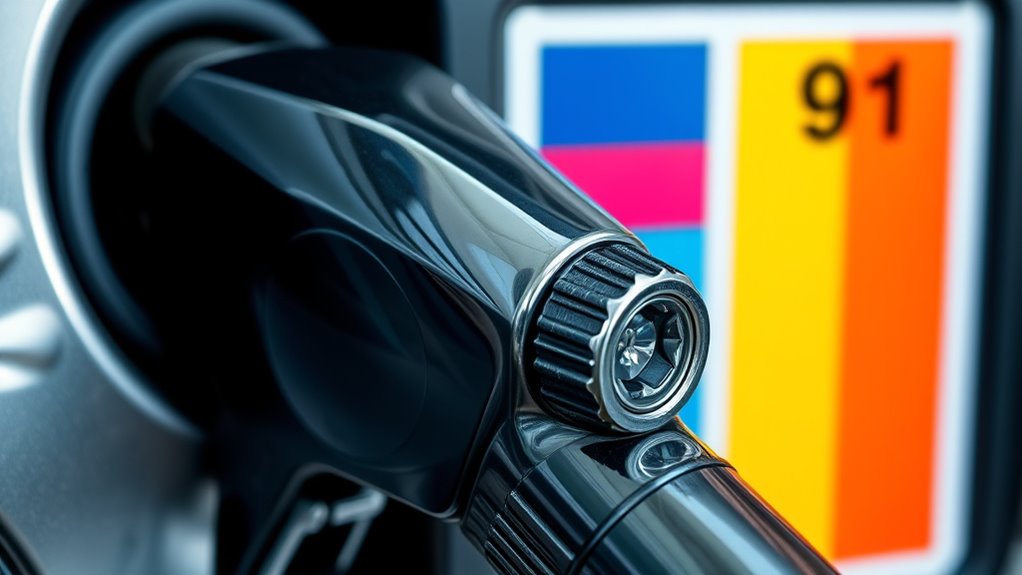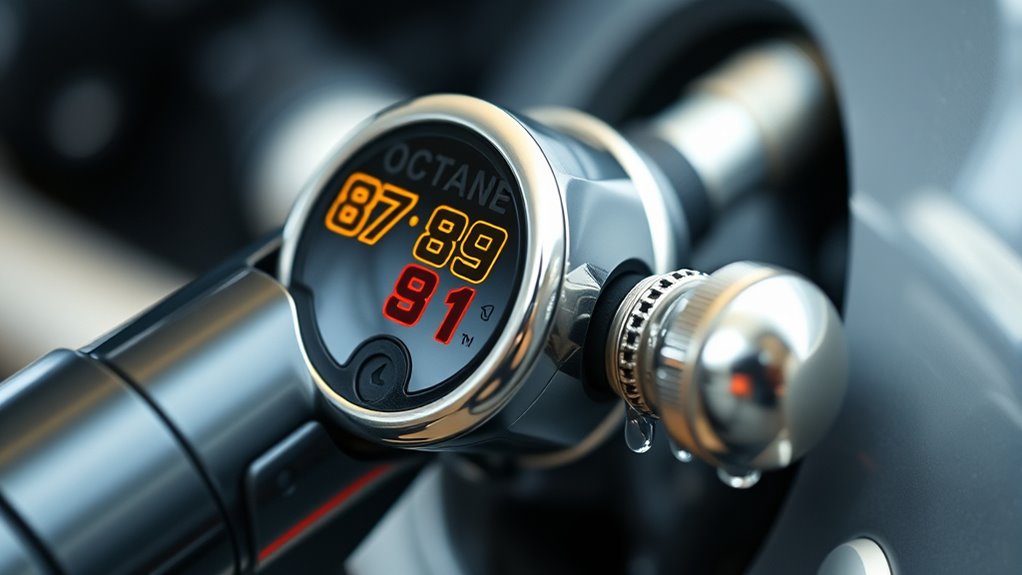Understanding octane ratings in fuel helps you choose the right type for your engine. The octane number shows how well fuel withstands knocking, which can damage your engine. Using the recommended octane guarantees smooth performance and prevents engine issues. Higher octane isn’t necessarily better unless your car’s manufacturer specifies it for high compression engines. If you want to learn how to pick the best fuel for your vehicle, keep exploring the details below.
Key Takeaways
- Octane rating indicates a fuel’s resistance to knocking during combustion, with higher ratings meaning better resistance.
- Using the correct octane as per manufacturer guidelines prevents engine knocking and promotes optimal performance.
- Higher octane fuels can withstand higher compression, but offer no benefits unless the engine specifically requires them.
- Lower octane fuel may cause engine knocking, reduced efficiency, and potential long-term engine damage.
- Octane ratings are especially important under heavy loads or high-performance conditions, where higher octane can improve engine stability.

When choosing fuel for your vehicle, understanding octane ratings can help guarantee peak performance and efficiency. Octane rating measures a fuel’s ability to resist knocking during combustion. Engine knocking, also known as pinging or knocking, occurs when the air-fuel mixture ignites prematurely in the engine cylinders, causing a knocking sound and potentially damaging your engine over time. High-octane fuels are less prone to knocking because they can withstand higher compression without igniting prematurely. If your car’s manufacturer recommends a specific octane level, sticking to that recommendation helps keep your engine running smoothly and prevents knocking, which can degrade performance and reduce fuel efficiency.
Using the right octane level for your vehicle can markedly impact fuel efficiency. When you use a fuel with a lower octane than required, your engine’s control system may have to compensate by adjusting timing or reducing power output to prevent knocking. These adjustments often lead to decreased fuel efficiency, meaning you’re using more fuel to get the same amount of work done. Conversely, using a higher-octane fuel than your engine needs generally doesn’t improve performance or fuel economy but does cost more at the pump. It’s crucial to follow the manufacturer’s guidelines, as your engine is calibrated to operate most efficiently with a specific octane rating. This ensures you’re not wasting money on unnecessary higher-octane fuel that won’t deliver added benefits.
Understanding octane ratings also helps you make smarter choices at the pump, especially when driving in different conditions. For example, if you’re towing heavy loads or driving in hilly terrain, your engine might operate under higher compression, making higher-octane fuel more advantageous to prevent knocking. On the other hand, for regular city driving, sticking to the recommended octane level keeps your engine running efficiently without unnecessary expense. Additionally, some newer engines are designed with advanced technology that adjusts to different fuel qualities, but even these systems work best when you provide the recommended octane fuel. Ignoring octane ratings or using the wrong fuel can lead to engine knocking, which not only causes noise and discomfort but may also reduce the lifespan of your engine.
Frequently Asked Questions
How Are Octane Ratings Determined in Laboratory Tests?
You determine octane ratings through engine testing and chemical analysis in labs. During engine testing, you use a standardized engine that runs on different fuel samples, noting when knocking occurs to find the fuel’s octane level. Chemical analysis helps verify the fuel’s composition, ensuring consistency. This combined approach provides an accurate measure of fuel’s resistance to knocking, helping you select the right octane rating for peak engine performance.
Do Higher Octane Fuels Improve Fuel Efficiency?
Think of your engine as a finely tuned orchestra; higher octane fuels act like a skilled conductor, ensuring smooth performance. Yes, higher octane fuels can improve engine performance, especially in high-compression engines, leading to better fuel economy. They prevent knocking and allow your engine to run more efficiently. So, if your vehicle recommends premium, using higher octane fuel helps your engine perform at its best, saving you money and enhancing drive quality.
Can Using a Higher Octane Fuel Damage My Engine?
Using a higher octane fuel won’t damage your engine if it’s not designed for it. In fact, it can help prevent engine knocking and improve performance. However, if your vehicle’s manufacturer recommends a specific octane, using a higher one won’t provide extra benefits and could be a waste. Always check your owner’s manual to guarantee fuel compatibility, and stick to the recommended octane for ideal engine health.
Are Octane Ratings Consistent Across Different Countries?
Octane ratings aren’t entirely consistent across different countries due to regional variations and international standards. You might find that a 95 octane in one country isn’t exactly the same as a 95 in another. Always check your vehicle’s manual and local fuel labels, and don’t assume octane ratings are directly comparable worldwide. This helps guarantee you’re using the right fuel and avoiding potential engine issues.
How Does Octane Rating Affect Emissions and Environmental Impact?
You might find it surprising, but higher octane fuel can actually reduce engine emissions and lessen your vehicle’s environmental impact, especially in high-performance engines. When you use the right octane, your engine runs more efficiently, producing fewer pollutants. Conversely, using low-octane fuel in a high-compression engine can cause knocking, increasing emissions. So, choosing the proper octane helps your car run cleaner and supports a healthier environment.
Conclusion
Think of octane ratings as the heartbeat of your engine’s symphony. Just as a conductor chooses the right tempo to bring harmony, selecting the proper octane keeps your engine running smoothly and efficiently. Higher octane acts as the steady drum, guiding your vehicle through life’s unpredictable rhythms. When you understand this balance, you hold the key to revealing your car’s true potential—fueling not just your journey, but your pursuit of excellence.









